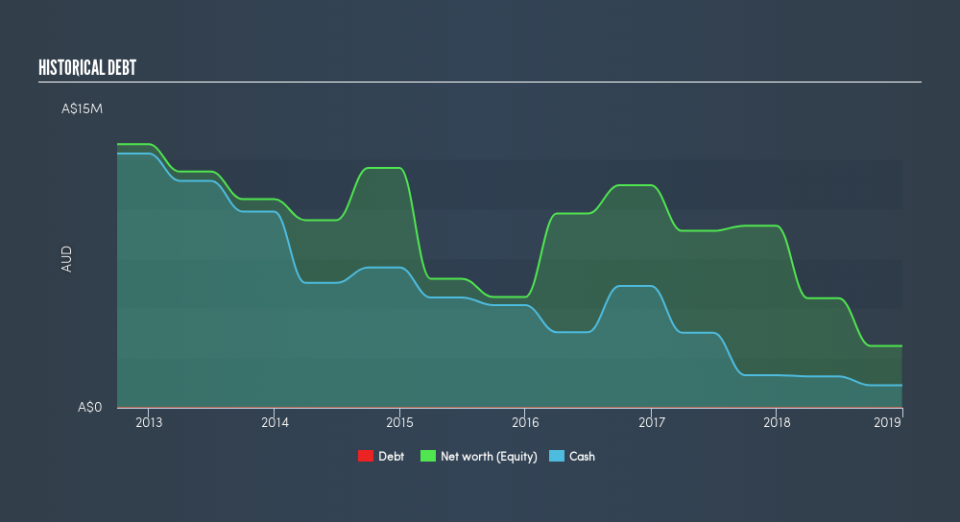Did You Manage To Avoid Aurora Minerals's (ASX:ARM) Devastating 86% Share Price Drop?

Want to participate in a short research study? Help shape the future of investing tools and you could win a $250 gift card!
As every investor would know, not every swing hits the sweet spot. But you want to avoid the really big losses like the plague. So consider, for a moment, the misfortune of Aurora Minerals Limited (ASX:ARM) investors who have held the stock for three years as it declined a whopping 86%. That might cause some serious doubts about the merits of the initial decision to buy the stock, to put it mildly. And the ride hasn't got any smoother in recent times over the last year, with the price 57% lower in that time. Shareholders have had an even rougher run lately, with the share price down 13% in the last 90 days.
We really hope anyone holding through that price crash has a diversified portfolio. Even when you lose money, you don't have to lose the lesson.
Check out our latest analysis for Aurora Minerals
With just AU$304,256 worth of revenue in twelve months, we don't think the market considers Aurora Minerals to have proven its business plan. You have to wonder why venture capitalists aren't funding it. As a result, we think it's unlikely shareholders are paying much attention to current revenue, but rather speculating on growth in the years to come. For example, investors may be hoping that Aurora Minerals finds some valuable resources, before it runs out of money.
Companies that lack both meaningful revenue and profits are usually considered high risk. There is usually a significant chance that they will need more money for business development, putting them at the mercy of capital markets. So the share price itself impacts the value of the shares (as it determines the cost of capital). While some such companies do very well over the long term, others become hyped up by promoters before eventually falling back down to earth, and going bankrupt (or being recapitalized). Some Aurora Minerals investors have already had a taste of the bitterness stocks like this can leave in the mouth.
When it last reported its balance sheet in December 2018, Aurora Minerals had cash in excess of all liabilities of AU$1.1m. That's not too bad but management may have to think about raising capital or taking on debt, unless the company is close to breaking even. We'd venture that shareholders are concerned about the need for more capital, because the share price has dropped 48% per year, over 3 years. You can click on the image below to see (in greater detail) how Aurora Minerals's cash levels have changed over time. You can see in the image below, how Aurora Minerals's cash levels have changed over time (click to see the values).
In reality it's hard to have much certainty when valuing a business that has neither revenue or profit. What if insiders are ditching the stock hand over fist? I would feel more nervous about the company if that were so. It costs nothing but a moment of your time to see if we are picking up on any insider selling.
What about the Total Shareholder Return (TSR)?
We'd be remiss not to mention the difference between Aurora Minerals's total shareholder return (TSR) and its share price return. The TSR is a return calculation that accounts for the value of cash dividends (assuming that any dividend received was reinvested) and the calculated value of any discounted capital raisings and spin-offs. We note that Aurora Minerals's TSR, at -80% is higher than its share price return of -86%. When you consider it hasn't been paying a dividend, this data suggests shareholders have benefitted from a spin-off, or had the opportunity to acquire attractively priced shares in a discounted capital raising.
A Different Perspective
Aurora Minerals shareholders are down 40% for the year, but the market itself is up 12%. However, keep in mind that even the best stocks will sometimes underperform the market over a twelve month period. Regrettably, last year's performance caps off a bad run, with the shareholders facing a total loss of 19% per year over five years. Generally speaking long term share price weakness can be a bad sign, though contrarian investors might want to research the stock in hope of a turnaround. Before spending more time on Aurora Minerals it might be wise to click here to see if insiders have been buying or selling shares.
Of course Aurora Minerals may not be the best stock to buy. So you may wish to see this free collection of growth stocks.
Please note, the market returns quoted in this article reflect the market weighted average returns of stocks that currently trade on AU exchanges.
We aim to bring you long-term focused research analysis driven by fundamental data. Note that our analysis may not factor in the latest price-sensitive company announcements or qualitative material.
If you spot an error that warrants correction, please contact the editor at editorial-team@simplywallst.com. This article by Simply Wall St is general in nature. It does not constitute a recommendation to buy or sell any stock, and does not take account of your objectives, or your financial situation. Simply Wall St has no position in the stocks mentioned. Thank you for reading.

